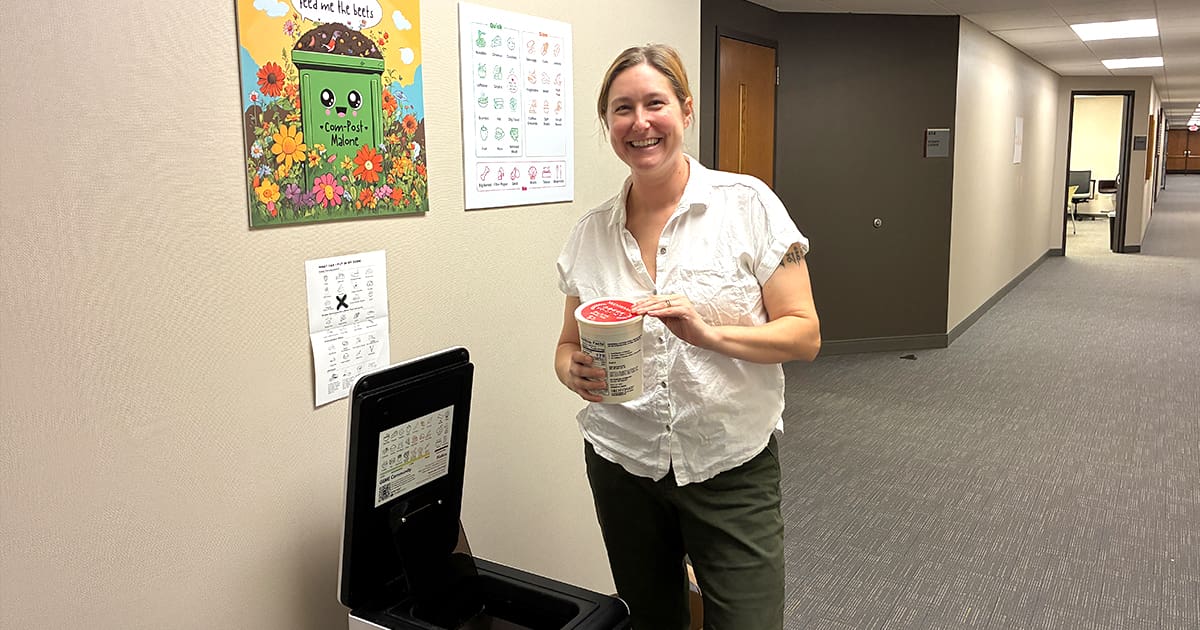UA Little Rock School of Social Work Reduces Food Waste with New Campus Composter

The University of Arkansas at Little Rock’s School of Social Work is taking a hands-on approach to sustainability thanks to a 2024 UA Little Rock Sustainability Grant.
Morgan Leyenberger, instructor of social work, used the grant to purchase a GEME electric composter, a high-tech, microbiotic system that converts food waste into usable compost within hours.
Installed in Ross Hall during the spring 2025 semester, the composter has quickly become a centerpiece for faculty, staff, and students in the School of Social Work who are committed to reducing waste. The system, which uses aeration and beneficial fungi to break down food, produces nutrient-rich compost used in gardens and office plants.
Leyenberger said the idea stemmed from the School of Social Work’s culture of community. Faculty, staff, and students regularly share meals on campus, creating an opportunity to reduce waste while modeling sustainability in everyday practice. With support from Phi Alpha, the social work honor society, students helped research the equipment, host composting workshops, and create educational materials encouraging their peers to participate. The students have enthusiastically named the composter, Com-Post Malone.
Faculty members have enthusiastically adopted the new system. Dr. Theresa Flowers, assistant professor of social work, uses compost from the unit in her backyard garden, where she grows vegetables and herbs with her young daughter.
“It’s been a fun process,” Flowers said. “The composter actually smells nice, and it’s kept me from having to figure out how to compost at home. It’s made sustainability simple.”
The department estimates that between 20 faculty and staff members and 100 on-campus students regularly use the composter. Together, they’ve produced around 20 gallons of compost since the composter was installed in the spring, diverting food scraps that would otherwise contribute to methane emissions in landfills.
The project has also inspired students to think more critically about their own environmental impact and the role they can play in building a more sustainable community.
Olivia Garderner, a Master of Social Work student, said the initiative aligns with the values of service and social responsibility that are central to her field.
“I was excited to see our department take on a project that shows how small actions can make a big difference,” Garderner said. “Composting may seem simple, but it’s a tangible way to reduce waste and take care of our planet. It makes sustainability feel personal and achievable.”
For Leyenberger, the project represents both environmental and educational impact.
“When we divert food waste from the trash, we’re reducing greenhouse gases and giving back to the Earth through our gardens,” Leyenberger said. “It’s a simple, tangible way for students and faculty to engage in sustainability.”
The initiative is part of UA Little Rock’s Sustainability Grants Program, which funds up to $2,500 for projects focused on energy efficiency, waste reduction, and sustainable campus operations. Dr. Kyungsun Lee, assistant professor of geography and chair of the sustainability grant committee, said Leyenberger’s project exemplifies the program’s goals.
“Morgan’s project is a great example of how small, thoughtful actions can make a lasting impact,” Lee said. “It’s inspiring to see the School of Social Work build sustainability into its daily routine.”
Leyenberger has invited the campus community to contact her at [email protected] if they are interested in using the composter.
